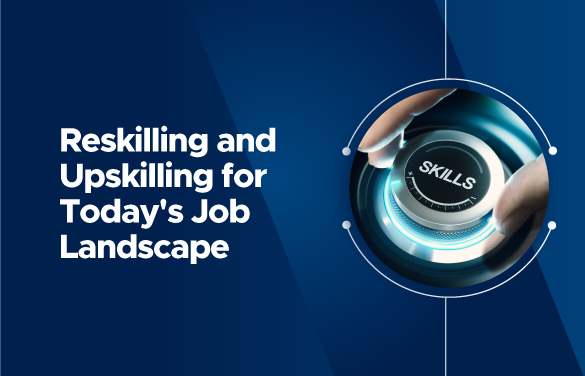- By SKIMT MBA
- November 9, 2023
- No Comments
Reskilling and Upskilling: Meeting the Needs of the Evolving Job Market
What is upskilling?
- Provides a competitive edge by developing innovative skills
- Improving existing ones
- Increased expertise
- Contribute to their teams and organisations more successfully
- Improves performance and productivity
What is reskilling?
- This transformational process enables people to change careers or industries, highlighting the critical importance of adaptability and ongoing learning in contemporary professional paths.
- Graduates have the option to choose their profession based on market needs, guaranteeing their continued value and employability in the face of changing sectors.
- It promotes an environment of continuous development and is increasingly valued. It is an example of the ability to leave one’s comfort zone, accept uncertainty, and start taking a journey.
Upskilling vs Reskilling:
Skill Adaptability:
Given how quickly the job market is changing, it is crucial to build skills that can be applied to a variety of industries and employment roles.
Consider putting your efforts towards learning transferable abilities like critical thinking, solving issues, interacting and flexibility.
These abilities can help you traverse several career opportunities and stay relevant in the ever-changing employment market.
Latest Technologies:
Stay up-to-date with the new technologies that are influencing the direction of many sectors. It includes artificial intelligence, machine learning, blockchain, and cybersecurity.
Spend some time learning about these technologies and pick up the necessary skills through online training, workshops, and real-world projects.
Having skills in modern technology can provide you with an advantage in the employment field. And the best example is that data analytics in business has a huge scope where it is necessary for sectors to make data-driven decisions.
Technical skills and soft skills:
Several industries have produced enormous quantities of information as a result of the digital age. In order to make wise decisions, organisations are depending more and more on data-driven insights. While technical skills are important, employers often place a high priority on soft skills and emotional intelligence.
Gaining knowledge of data analytics tools and methodologies and developing data literacy skills can greatly improve a career. To become proficient in this area, think about taking courses in statistical analysis, data visualisation, and analytics.
Effective communication, teamwork, leadership, adaptability, and empathy are some of these abilities. Your chances of career advancement will be enhanced if you develop these abilities in along with your technical knowledge.
Lifelong Learning:
To stay on top of your field, maintain your curiosity, investigate new prospects, and adopt a continual learning mindset.



